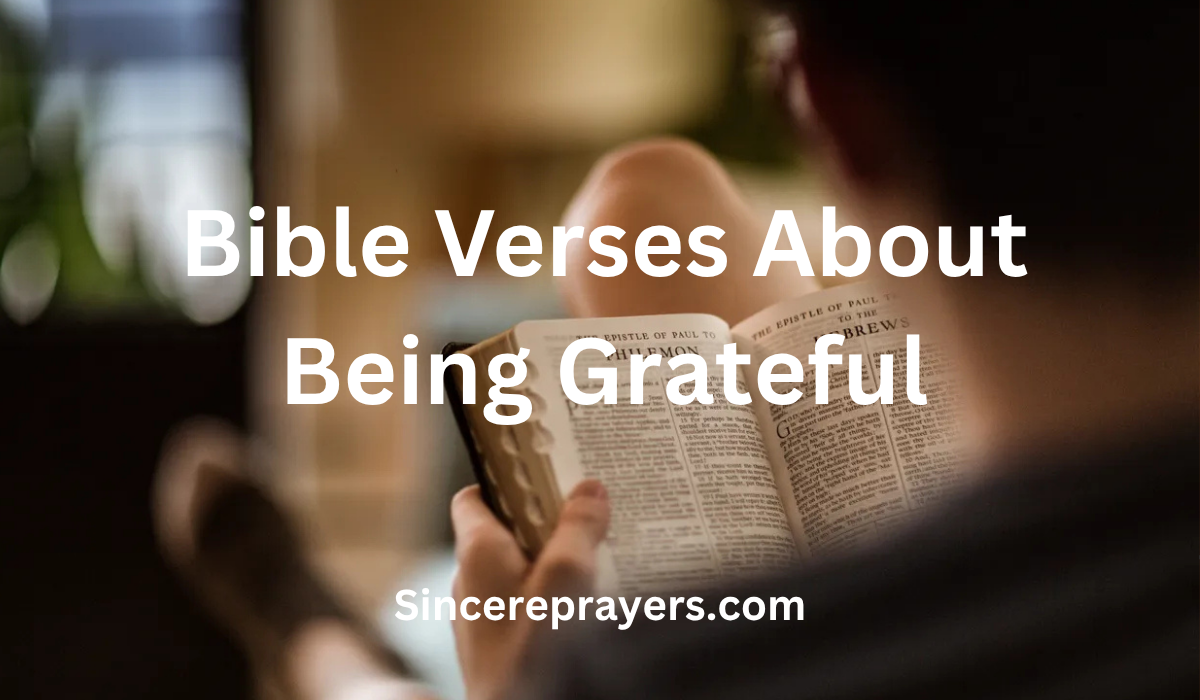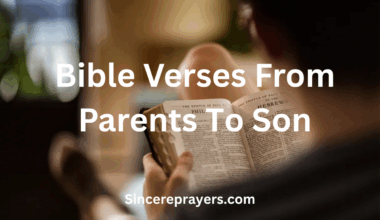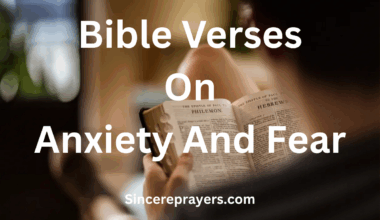An attitude that acknowledges God for His blessings and transcends circumstances, gratitude is a fundamental component of the Christian life. A grateful heart acknowledges God’s benevolence and sovereignty, understanding that He is the source of all provision, victory, and peaceful moments. Being grateful is more than just an emotional reaction; it is a spiritual practice that deepens our faith, broadens our viewpoint, and brings us nearer to the Lord.
The value of being grateful in any circumstance is emphasized often in the Bible verses about being grateful. Believers are called to give thanks to God regardless of their circumstances, believing that He is bringing everything together for their benefit. Joy, humility, and reliance on God are fostered by an appreciative heart, which molds our personalities to reflect His wisdom and love. Having gratitude increases our awareness of God’s faithfulness throughout life and provides opportunities to spiritual knowledge.

Gratitude is a way of life that recognizes God’s presence and sustenance; it goes beyond simply expressing “thank you.” Scripture exhorts believers to give thanks in every situation, pray constantly, and rejoice constantly. This viewpoint turns hardships into chances for spiritual development as we come to trust in God’s direction and appreciate all of His gifts, no matter how minor. By allowing us to show others grace, kindness, and appreciation as a reflection of God’s love, gratitude also improves our relationships.
This article offers 35 inspirational Bible passages about gratitude, each of which provides a different perspective on developing an attitude of gratitude. These passages offer spiritual support and encouragement, ranging from sentiments of gratitude to lessons on humility. As you reflect on them, let God’s Word change your thoughts, deeds, and attitudes by inspiring a heart of sincere thankfulness. Adopt an attitude of gratitude and feel the joy and serenity that come from living a life rooted in God’s goodness.
35 Most Effective Bible Verses About Being Grateful in 2025
1. 1 Thessalonians 5:18
“Give thanks in all circumstances; for this is God’s will for you in Christ Jesus.”
This verse teaches that gratitude is not conditional on our circumstances but is a command from God. It reminds us that thankfulness is part of a faithful life in Christ. By choosing to give thanks regardless of trials or blessings, we align our hearts with God’s will, cultivate joy, and strengthen our relationship with Him. Gratitude becomes a spiritual practice that transcends feelings and reflects trust in God’s providence.
2. Psalm 100:4
“Enter his gates with thanksgiving and his courts with praise; give thanks to him and praise his name.”
Psalm 100 emphasizes approaching God with a heart of gratitude. Worship begins with thanksgiving, acknowledging God’s goodness and faithfulness. By intentionally offering thanks, we prepare our hearts to experience His presence more fully. This verse encourages believers to view every interaction with God as an opportunity for praise, allowing gratitude to guide worship and deepen intimacy with the Creator.
3. Colossians 3:17
“And whatever you do, whether in word or deed, do it all in the name of the Lord Jesus, giving thanks to God the Father through him.”
Colossians 3:17 links gratitude with every aspect of life. Our actions, words, and decisions are opportunities to honor God and express thankfulness. By centering our lives on Christ and offering thanks in all we do, we cultivate a lifestyle that reflects our faith. Gratitude becomes the lens through which our daily choices mirror God’s love and wisdom, shaping our character and witness.
4. Philippians 4:6
“Do not be anxious about anything, but in every situation, by prayer and petition, with thanksgiving, present your requests to God.”
Here, Paul highlights gratitude as a remedy for anxiety. By presenting our requests to God with thanksgiving, we acknowledge His sovereignty and provision. Gratitude shifts focus from worry to trust, reminding us that God is attentive to our needs. This practice nurtures peace, encourages faith, and allows believers to maintain perspective during challenging seasons of life.
5. Psalm 107:1
“Give thanks to the Lord, for he is good; his love endures forever.”
Psalm 107 celebrates God’s enduring love and goodness. Expressing thanks is an acknowledgment of His unwavering faithfulness. By recognizing His consistent care and mercy, believers develop a heart of gratitude that endures across life’s seasons. This verse inspires believers to praise God for His eternal love, which forms the foundation of trust and spiritual contentment.
6. Psalm 95:2
“Let us come before him with thanksgiving and extol him with music and song.”
This verse encourages believers to approach God with joyful gratitude, combining worship and thanksgiving. Expressing thanks through song and praise reminds us of God’s goodness and faithfulness. Gratitude becomes an active form of worship, shaping our hearts to recognize God’s constant presence. By making thankfulness a part of our daily life, we cultivate spiritual joy, strengthen our faith, and deepen intimacy with the Lord.
7. Ephesians 5:20
“Always giving thanks to God the Father for everything, in the name of our Lord Jesus Christ.”
Ephesians 5:20 emphasizes that gratitude should be continual and comprehensive. Giving thanks for every blessing, big or small, reflects a heart aligned with God’s will. This practice acknowledges God’s sovereignty and cultivates a perspective of joy and contentment. By consistently offering thanks in Jesus’ name, believers demonstrate trust in His provision and celebrate His faithfulness, reinforcing a lifestyle grounded in praise and spiritual maturity.
8. Psalm 118:24
“This is the day that the Lord has made; let us rejoice and be glad in it.”
Psalm 118:24 teaches gratitude by encouraging us to celebrate each day as a gift from God. Rejoicing daily acknowledges His sovereignty and provision. This verse reminds believers that even ordinary moments are opportunities to express thankfulness and joy. Embracing each day with a grateful heart shifts our focus from challenges to God’s blessings, cultivating contentment, hope, and a spirit of praise regardless of circumstances.
9. 1 Chronicles 16:34
“Give thanks to the Lord, for he is good; his love endures forever.”
This verse emphasizes the eternal nature of God’s love as a reason for constant gratitude. Recognizing God’s goodness and unending mercy fosters a thankful heart that perseveres through trials. By reflecting on His enduring love, believers cultivate trust and confidence in God’s faithfulness. Gratitude in response to God’s character strengthens our spiritual perspective and encourages praise in every season of life, reinforcing our reliance on His unfailing care.
10. Hebrews 12:28
“Therefore, since we are receiving a kingdom that cannot be shaken, let us be thankful, and so worship God acceptably with reverence and awe.”
Hebrews 12:28 connects gratitude with worship, reminding us that thankfulness is an appropriate response to God’s unshakable kingdom. Recognizing the eternal security provided by Christ inspires reverence and heartfelt worship. Gratitude here is not superficial; it’s rooted in an awareness of God’s power, faithfulness, and the blessings of salvation. A thankful heart deepens worship and aligns believers with God’s perspective, shaping both attitude and action.
11. Psalm 136:1
“Give thanks to the Lord, for he is good. His love endures forever.”
Psalm 136 reminds us that gratitude flows from recognizing God’s enduring love and goodness. Each act of thanksgiving acknowledges His faithfulness across all generations. By focusing on His eternal mercy, believers cultivate a heart of gratitude that transcends circumstances. Repeating this truth encourages praise, strengthens faith, and inspires joy, reinforcing the importance of expressing thanks consistently and sincerely as a reflection of trust in God’s unwavering character.
12. Psalm 9:1
“I will give thanks to you, Lord, with all my heart; I will tell of all your wonderful deeds.”
This verse demonstrates that gratitude involves both inner devotion and outward expression. Thankfulness engages the heart, mind, and actions as believers recount God’s marvelous works. Sharing testimonies of His goodness strengthens faith and encourages others. By acknowledging His deeds, we cultivate awareness of God’s presence and provision. Gratitude becomes an active practice that deepens intimacy with God while spreading hope and joy to those around us.
13. Colossians 2:6-7
“So then, just as you received Christ Jesus as Lord, continue to live your lives in him, rooted and built up in him, strengthened in the faith as you were taught, and overflowing with thankfulness.”
Colossians 2:6-7 emphasizes that gratitude is an essential fruit of spiritual growth. Being “rooted and built up” in Christ naturally produces thankfulness that overflows into daily life. Gratitude is a response to the foundation of faith and the teaching of God’s Word. When our lives are grounded in Christ, thankfulness flows naturally, influencing thoughts, attitudes, and actions, while fostering stability, joy, and resilience in the believer’s journey.
14. Psalm 92:1-2
“It is good to praise the Lord and make music to your name, O Most High, proclaiming your love in the morning and your faithfulness at night.”
This passage shows that gratitude is a continual practice, expressed in both morning and evening. Recognizing God’s love and faithfulness daily strengthens our spiritual perspective. Gratitude is linked with worship and proclamation, reminding believers to reflect on God’s goodness throughout life. By integrating thanksgiving into our routines, we nurture a consistent awareness of His provision and develop a joyful, thankful heart that honors Him in every season.
15. 2 Corinthians 9:15
“Thanks be to God for his indescribable gift!”
Paul emphasizes that gratitude flows naturally when we recognize God’s incomparable blessings, particularly the gift of salvation through Christ. Thankfulness is not merely polite acknowledgment but heartfelt praise for God’s generosity and love. By reflecting on His gifts, believers develop humility and appreciation for His provision. Gratitude deepens our connection with God, encourages worship, and reminds us that every blessing ultimately originates from His grace and mercy.
16. James 1:17
“Every good and perfect gift is from above, coming down from the Father of the heavenly lights, who does not change like shifting shadows.”
James highlights the divine source of all blessings. Recognizing that every good gift comes from God fosters a grateful heart and combats entitlement. Thankfulness acknowledges His unchanging character and generous provision. By attributing all success, joy, and provision to Him, believers cultivate humility and a sense of reliance on God. Gratitude becomes a lens through which we view life, shaping our attitudes, actions, and worship consistently.
17. Psalm 28:7
“The Lord is my strength and my shield; my heart trusts in him, and he helps me. My heart leaps for joy, and with my song I praise him.”
This verse connects gratitude with trust and joy. A thankful heart arises from recognizing God’s protection and help in life. Gratitude and praise are natural responses to His faithfulness, fostering confidence and joy. By acknowledging His provision and care, believers are encouraged to express thankfulness not just in words, but through song and celebration. Gratitude thus strengthens faith, lifts spirits, and inspires continuous worship of God.
18. Psalm 147:7
“Sing to the Lord with grateful praise; make music to our God on the harp.”
Psalm 147:7 teaches that gratitude is intimately connected with joyful worship. Expressing thankfulness through music reflects inner appreciation for God’s provision and care. This verse encourages believers to actively celebrate God’s goodness through artistic and heartfelt expression. Gratitude is not passive; it involves creativity, participation, and intentional acknowledgment of His blessings. By doing so, our hearts are aligned with praise, deepening spiritual joy and connection with the Lord.
19. 1 Chronicles 16:8
“Give praise to the Lord, proclaim his name; make known among the nations what he has done.”
Here, gratitude extends beyond personal thanksgiving to public acknowledgment of God’s deeds. Sharing His goodness encourages both our faith and the faith of others. By proclaiming His works, believers participate in a culture of thankfulness that transcends individual circumstances. Gratitude becomes a testimony, strengthening community and inspiring worship. Recognizing God’s provision motivates believers to actively praise Him, reflecting His faithfulness and nurturing spiritual growth.
20. Psalm 69:30
“I will praise God’s name in song and glorify him with thanksgiving.”
This verse links praise and thanksgiving as complementary expressions of gratitude. Gratitude motivates worship and glorifies God’s character and deeds. By intentionally offering thanks, believers cultivate a joyful and devoted heart. Gratitude is not merely a feeling but an active lifestyle that permeates worship, prayer, and daily living. Expressing thankfulness strengthens faith, inspires others, and deepens spiritual intimacy with the Lord.
21. Psalm 69:31
“I will praise the name of God with a song; I will magnify him with thanksgiving.”
This verse emphasizes that gratitude magnifies God’s greatness. By expressing thanks through song, believers honor His character and deeds. Gratitude is a form of worship that transforms our perspective, helping us focus on God’s faithfulness rather than life’s difficulties. Cultivating a thankful heart nurtures joy, strengthens faith, and inspires continual praise, reminding us that our acknowledgment of God’s goodness reflects trust and devotion in every circumstance.
22. Jonah 2:9
“But I, with shouts of grateful praise, will sacrifice to you. What I have vowed I will make good. I will say, ‘Salvation comes from the Lord.’”
Jonah demonstrates that gratitude naturally flows from recognition of God’s deliverance. Expressing thanks in prayer and vows acknowledges God’s power and mercy. Gratitude here is tied to salvation and divine intervention, inspiring devotion and trust. By proclaiming that salvation comes from the Lord, believers cultivate humility, reliance on God, and a heart that celebrates His faithfulness through both words and committed actions.
23. Psalm 106:1
“Praise the Lord. Give thanks to the Lord, for he is good; his love endures forever.”
Psalm 106:1 highlights gratitude as a response to God’s enduring love. By giving thanks, believers acknowledge His unchanging goodness and mercy. Gratitude becomes a lens for interpreting life, allowing us to focus on God’s faithfulness even amid challenges. Consistent thankfulness strengthens our relationship with God, fosters spiritual resilience, and cultivates joy, creating a lifestyle that honors Him through praise and recognition of His steadfast love.
24. Romans 1:8
“First, I thank my God through Jesus Christ for all of you, because your faith is being reported all over the world.”
Paul exemplifies gratitude by giving thanks for the faith of others. Expressing thanks to God for the people in our lives nurtures relationships and encourages mutual growth. Gratitude extends beyond personal blessings, highlighting the value of community and spiritual influence. By appreciating and thanking God for others, believers cultivate humility, joy, and recognition of God’s work in their midst, reinforcing a thankful heart as an essential part of Christian living.
25. Philippians 1:3
“I thank my God every time I remember you.”
Paul demonstrates that remembering God’s blessings and the people He places in our lives naturally leads to gratitude. Reflecting on God’s faithfulness fosters a heart of thankfulness and strengthens relational bonds. Gratitude deepens spiritual awareness, promoting joy and contentment. By regularly giving thanks for the people, blessings, and guidance God provides, believers cultivate a lifestyle centered on acknowledgment of His goodness and enduring love.
26. 2 Thessalonians 1:3
“We ought always to thank God for you, brothers and sisters, and rightly so, because your faith is growing more and more.”
This verse emphasizes gratitude as a recognition of spiritual growth in others. Thankfulness extends to witnessing God’s work in people’s lives, inspiring encouragement and mutual edification. Gratitude shifts focus from personal needs to God’s active hand in the lives of others. By celebrating growth, faith, and perseverance, believers cultivate a heart that praises God, honors His work, and encourages the community of faith through acknowledgment and thanksgiving.
27. Psalm 30:12
“That my heart may sing your praises and not be silent. Lord my God, I will praise you forever.”
Psalm 30:12 expresses gratitude as an ongoing, active response to God’s blessings. A thankful heart refuses silence, choosing praise and celebration over indifference. Gratitude strengthens spiritual perspective, fosters joy, and nurtures continuous worship. By praising God in every circumstance, believers reinforce trust, reliance, and acknowledgment of His mercy, creating a consistent practice that aligns the heart with God’s goodness and deepens intimacy with Him.
28. Nehemiah 12:46
“For long ago, in the days of David and Asaph, there had been directors of the musicians and songs of praise and thanksgiving to God.”
This verse demonstrates that gratitude has always been central to worship. Music and organized praise reflect intentional acknowledgment of God’s provision. Believers are called to follow this example, expressing thanks through song and structured worship. Gratitude strengthens spiritual discipline, fosters community, and cultivates joy. By remembering and participating in the practice of thanksgiving, we honor God’s faithfulness and establish habits of praise that sustain our spiritual lives.
29. 1 Corinthians 15:57
“But thanks be to God! He gives us the victory through our Lord Jesus Christ.”
Paul emphasizes gratitude as a response to victory in Christ. Thankfulness acknowledges God’s power and provision in triumphs over sin, trials, and adversity. Gratitude strengthens faith, reinforces hope, and cultivates joy. By giving thanks for the victories God provides, believers recognize His sovereignty and grace, fostering spiritual resilience and a lifestyle of continual praise for His saving power and unending love.
30. Psalm 118:1
“Give thanks to the Lord, for he is good; his love endures forever.”
This verse reminds believers that God’s goodness and steadfast love are sufficient reasons for continual gratitude. Thankfulness shapes our perspective, focusing on His mercy rather than life’s difficulties. Expressing thanks nurtures contentment, joy, and worship, reinforcing trust in His faithful character. Gratitude becomes a lifestyle, reflecting recognition of God’s blessings and fostering spiritual growth that honors His unchanging goodness and enduring love.
31. 1 Peter 5:7
“Cast all your anxiety on him because he cares for you.”
Gratitude is linked with trust in God’s care. By releasing worries into His hands, believers acknowledge His provision and love. Thankfulness grows as we recognize God’s attentiveness and faithfulness. Gratitude transforms anxiety into reliance, encouraging peace and spiritual resilience. Expressing thanks for God’s care strengthens faith, deepens intimacy with Him, and nurtures a heart that rejoices in His unfailing guidance and protection.
32. Psalm 107:8
“Let them give thanks to the Lord for his unfailing love and his wonderful deeds for mankind.”
Psalm 107:8 emphasizes that gratitude recognizes God’s mercy and miraculous works. Thankfulness arises when we acknowledge His provision, healing, and protection. By reflecting on His deeds, believers cultivate joy and spiritual awareness. Gratitude becomes both an expression of praise and a spiritual habit that aligns our hearts with God’s character, fostering worship, humility, and a deeper appreciation for His ongoing faithfulness.
33. Isaiah 12:4
“In that day you will say: ‘Give praise to the Lord, proclaim his name; make known among the nations what he has done, and proclaim that his name is exalted.’”
Isaiah 12:4 links gratitude with proclamation. Thankfulness motivates believers to share God’s goodness with others. By praising and declaring His deeds, gratitude extends beyond personal devotion into community and witness. Recognizing His works encourages joy, fosters worship, and strengthens faith. Gratitude thus becomes a tool for spiritual influence, celebrating God’s faithfulness and inspiring others to recognize His mercy and sovereignty.
34. Psalm 145:10
“All your works praise you, Lord; your faithful people extol you.”
Psalm 145:10 emphasizes that both creation and believers respond to God with gratitude. Thankfulness acknowledges His mighty works, provision, and enduring faithfulness. Gratitude is a communal and personal expression of praise, fostering joy and spiritual unity. By participating in this continuous cycle of thanks, believers align with God’s purposes, deepen their relationship with Him, and cultivate a lifestyle of worship rooted in recognition of His goodness.
35. Revelation 11:17
“We give you thanks, Lord God Almighty, the One who is and who was, because you have taken your great power and begun to reign.”
In Revelation 11:17, gratitude arises from acknowledging God’s sovereign power and eternal reign. Thankfulness recognizes His authority over history, life, and all creation. Expressing gratitude in this way strengthens faith, fosters worship, and encourages trust in His ultimate plan. Believers cultivate a heart of reverence and joy, acknowledging God’s control, celebrating His victories, and rejoicing in His eternal goodness and faithfulness.
Conclusion
Gratitude transforms the believer’s life by shifting focus from circumstances to God’s steadfast faithfulness. As we meditate on Scripture, we discover that thankfulness is not a passive response but an active expression of faith and trust. It cultivates joy, deepens our relationship with God, and empowers us to navigate life’s challenges with hope and perspective. Every act of gratitude acknowledges God’s provision and reflects a heart aligned with His will.
Practicing gratitude also influences our character and relationships. Thankful hearts are humble, patient, and generous, fostering love and kindness toward others. By giving thanks in all situations, believers cultivate resilience and spiritual maturity. Gratitude transforms ordinary moments into opportunities for praise, shaping a life that testifies to God’s goodness and presence. It becomes a lifestyle that reflects the divine perspective rather than the limitations of human understanding.
Ultimately, Scripture reminds us that gratitude is both a discipline and a privilege. Through thanksgiving, we acknowledge God’s sovereignty, celebrate His blessings, and cultivate joy that transcends circumstances. As you reflect on these 35 verses, allow gratitude to permeate every thought, action, and relationship. By embracing a heart of thankfulness, you will experience God’s peace, joy, and enduring love in profound and transformative ways.




